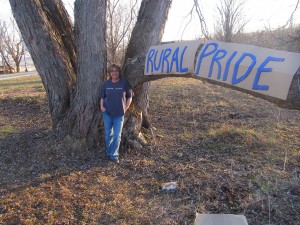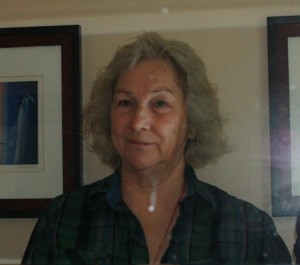The Georgetown Conference…Rural Redefined!

There’s definitely truth in those words…those us of who live in rural NB have certainly had our lives upended as pulp mills close, family farms are sold to corporate agricultural interests and the government closes hospitals and constantly seeks to reduce health care and social services in our communities.
Our kids leave town for greener pastures, and most never return.
A sense of hopelessness has gripped many people…when someone new moves into our small villages many of these newcomers are immediately asked “Why on earth did you move here?”
Many people still believe in their communities, however, and they still have faith in the power of our community spirit and ingenuity to overcome these rural challenges.
This October the tiny town of Georgetown in PEI, will host a conference that will bring together people and ideas from throughout Atlantic Canada.
This Georgetown Conference will be about harnessing the spirit that exists in every rural community, and helping the people of those communities find new ways to not only just survive…but to truly thrive!
People with a stake in their own communities will be attending this conference in order to arm themselves with tools and ideas that they can implement in their own communities.
This conference will focus on ideas and success, not the failures of the past. In order to rebuild our faltering rural economies and create new jobs and industries we need to say goodbye to the past, get creative and think outside of the box!
Two local citizens have been accepted to attend this conference. Francine St. Amand of has long been an advocate of our rural communities. She grew up in California Settlement, and she came back to live on her old family farm.

attending the Georgetown Conference October 3-5, 2013
There is a screening process in order to attend the conference…participants must demonstrate that they are truly interested in learning new ways to help their communities by writing a brief essay outlining why they are committed to this cause.
Both essays capture the challenges and hopes of the people of rural New Brunswick….
Why I’m going to Georgetown:
The Flood of All Floods on March 23, 2012 in Perth-Andover, New Brunswick was the event that catapulted me to express my concerns as a rural citizen and to take action. The Flood and its aftermath exposed the fragile skeleton of what was once a vibrant and prosperous community beautifully nestled in the hills of the Upper St.John River Valley.
Aside from the obvious problems associated with a dammed river, the build-up of silt due to clear cutting and agriculture, and climate change, the Flood exposed the vulnerabilities of a rural community that is on life-support rather than supporting life.
The primary sectors of agriculture, forestry and fishery have been gutted and now largely controlled by multi and trans-nationals. Where people and families in this rural area used to have livelihoods, they are chasing after jobs here, there and everywhere to eek out a living.
I don’t pretend to believe that we can go back to the 50’s in these primary sectors but I believe that we can move forward to transform these sectors to respond to contemporary environmental, health, social and economic concerns.
REBIRTH LIVELIHOODS. RECLAIM RURAL PRIDE.
GEORGETOWN. IT GIVES ME HOPE!
Francine St. Amand
Why I’m going to Georgetown:
I am attending the Georgetown Conference with enthusiasm because I am looking forward to meeting people from such a broad spectrum of rural Atlantic Maritime communities, who are pondering the same problems we are facing in our area. So many of us sit both on the sidelines and/or in positions of influence and watch with a feeling of helplessness and hopelessness as our way of life slides away. As our towns and villages, which have thrived for hundreds of years, succumb to subtle nearly invisible forces, we often feel that we alone recognize the steady erosion, and feel a slight horror that our friends and neighbors don’t seem to care.
I am thrilled by the number of attendants!personally believe with all my heart we can revitalize our communities, to support richer living and livelihoods!are still our greatest resource.needs to be redefined.to 100 years ago people made what ever they needed; furniture, tools, shoes, cloths, etc. People in a town/village “crafted” what people needed, furniture; kitchen, living room, dressers, beds etc. There were Cobblers. Pharmacist, Bakers and Banker, Dr, Craftsman. Tradesman. Rural areas need to craft-people. People who can craft what we need and what others need.we are spending our resources; our money and our children somewhere else.need Crafty Schools.
I moved to Canada from Western U.S. when I was 18 years old. My parents were ‘migrant workers’, which means I grew up in rural areas in the Western states of California, Oregon, Washington, Idaho.have lived at the Tobique First Nations community in northern New Brunswick for 40 years. I worked at the Tobique Health and Wellness Center for the past 4 years as a Family Mentor from 2008 to 2012. Living in and working in this village afforded me an unpleasant view of the impact, restrictions, and isolation rural life can have on community.10 years I worked an 18 acre hobby farm , on the Tobique River, with my young daughter, in an attempt at a sustainable way to live. I now know what not to do, and some more realistic ideas of what could work.
I am now participating in an effort to build a land trust based sustainable community in South Knowlesville, NB. Young families are striving to redefine the ideas of wealth, where food comes from, and how homes are built, and many other earth based ways that put humans back in touch simple healthy living.
I would offer a broad spectrum of participant-observer experience in rural living.would benefit from this conference by not only learning what others are doing, but what is working. If two heads are better than one, then it stands to reason with over 200 we have to opportunity to change anything.
Linda Nicholas
The conference is still hoping to have more representatives from New Brunswick in attendance. To submit an application, go to:
Thegeorgetownconference.ca/want-to-attend
Many of the people that we talk to have a sense of impending but inescapable doom when it comes to the future of their hometowns, and they have felt powerless to turn the tide.
There is power in numbers, though, and this conference will generate ideas and strategies to redefine our villages.
One of the speakers will be Zita Cobb, of Fogo Island, NFLD.
Zita grew up on the island, one of seven kids in a home with no running water or electricity. A classic case of hometown girl made good, she got rich in the tech industry and came back to nurse her home community back to health and foster cultural resiliency.
Zita has a vision to make Fogo Island and the neighboring Change Islands into an international destination for the arts, and in turn, tourists.
Her Shorefast Foundation has erected the modernist Fogo Island Inn, a 29 room, five star hotel that is an upmarket inn where tourists can stay when they come to see the art, take in the landscape and experience the culture.
Local boat builders, who were out of work as the fishing industry tanked, became furniture makers as they handcrafted the custom beds, tables and chairs for the inn.
Culture, history and tourism will support this ambitious venture…and it is an inspiration that our rural NB communities can look to as well.
Stephanie Kelley
